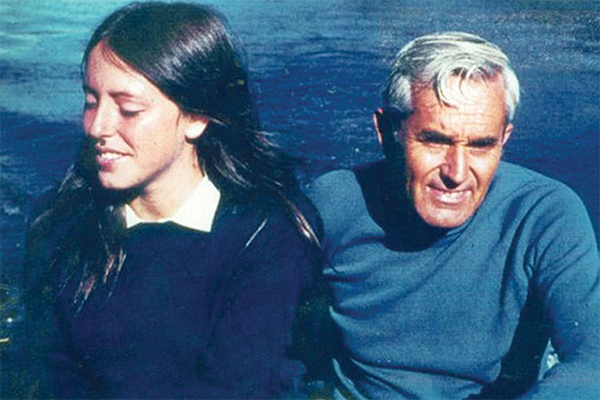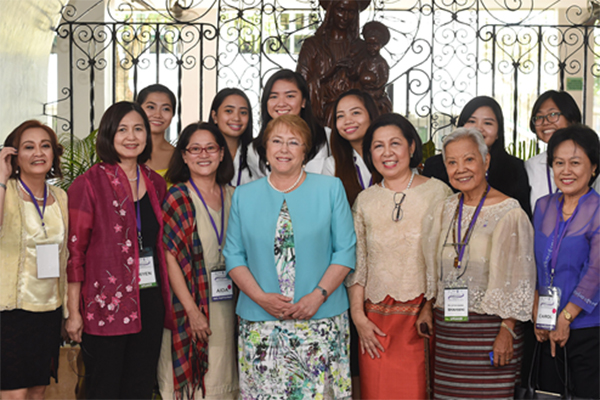APEC and the feminists’ sweetheart
"It's not enough for women to sit at the table. I want to decide the size and shape of the table I'm sitting at." So quipped President Michelle Bachelet of Chile at Miriam College last November 17. In an instant, I was charmed.
Filipino netizens, in the meantime, have been swooning over two “APEC hotties”—President Peña Nieto of Mexico and Prime Minister Justin Trudeau of Canada. But Nieto has been criticized for corruption, narcopolitics and violence in Mexico’s Guerrero state, while Trudeau has been attacked because of Canadian trash that has hit Philippine shores—so it’s a toss-up.
There have, of course, been other leaders worthy of our attention. Obama’s skills at moderation—and recent pronouncements on the West Philippine Sea—were certainly an APEC highlight. But Bachelet, one of two women leaders (along with President Park Geun-hye of the Republic of Korea) visiting the Philippine capital during the APEC talks, was a breath of fresh air.
Last Tuesday, she visited Miriam College—the second oldest women’s college in the Philippines—for a “Dialogue with Women and Youth.” The National Women’s Summit—a welcome respite from the stiffness of APEC—gathered mostly female guests from the Senate and the House, national government, civil society, local governments, the Muslim community, and students to discuss the empowerment of women, especially in economic and political spheres.
The fact that she had officially requested to meet with women and the youth in this country—and not only business leaders who might have been beneficial to Chile—made Bachelet an instant media darling. Only Akie Abe, wife of Prime Minister Shinzo Abe, came close by visiting street children in Payatas.
A physician, Bachelet was elected as the first female President of Chile in 2006 and re-elected in 2014. Before this, she served as Chile's health minister in 2000 and defense minister in 2002—the first woman in Latin America to hold such a position.
During the summit, the Latin American leader commended the Philippines for empowering women since the Katipunan of 1896 and throughout the Marcos dictatorship. She further congratulated us for ranking 9th in the World Economic Forum’s Global Gender Gap Report 2014, noting that we are the only Asian country to have closed the gap in education and health. On women in government, she noted the 26% participation rate in Philippine politics—higher than the Asian average of 18.4%—and the Chilean rate of 16%.
As the first head of UN Women—the agency in charge of promoting gender equality and women’s empowerment at the United Nations—she noted that there are still many challenges for women hoping to break the proverbial glass ceiling globally.
“In my country, we had a female Senate President and female presidents of trade unions, but we still have many issues. Women have difficulty accessing credit. We still have violence against women. The face of poverty is still that of women and children….”
As former defense minister, Bachelet also stressed the importance of having women in the military and police. “Defense is not just a matter of men but of society, and women are a part of that. In countries where we send peace-keepers, women have low self-esteem because they are treated like second-class citizens. They find it hard to talk about rape, gang-rape and torture. But women peacekeepers gain their confidence and trust in conflict-torn areas,” she said.
These words are all the more poignant when one considers Bachelet’s own personal history. Her father was an air force general and staunch supporter of President Salvador Allende, who put him in charge of food distribution. He was later accused of treason and detained by General Augusto Pinochet, following the US-backed 1973 coup that ousted Allende. General Bachelet had an enormous influence over his daughter: when he died, in 1974—at the hands of his torturers—she was already an active member of the Young Socialist Party.
 ??
??
Young Michelle Bachelet with her father, General Alberto Bachelet. Photo courtesy of Michelle Bachelet
“Because I was a victim of hate,” she told an interviewer, “I’ve dedicated my life to turning hate into understanding, tolerance—and why not say it?—love.”
She herself, along with her mother (an archeologist), was detained and tortured in early 1975, forcing her to flee Chile for Australia and Germany, where she continued her medical studies. When allowed to return to her homeland in 1979—less than a third of the way through Pinochet’s 17-year rule—she discovered Chile refused to recognize her medical studies from the Herder Institute—now Leipzig Institute--forcing her to take up her medical education from where it had been before she had fled the country.
Armed with her MD, she worked with an NGO that helped the children of tortured and missing people in Santiago and Chilán. With the restoration of democracy in 1990, she returned to public service. From 1994 to 1997, she was Senior Assistant to the Deputy Health Minister. In 1998, she also worked for the Defense Ministry as Senior Assistant to the Defense Minister and subsequently graduated from the Chilean Army's War Academy with a Master's in Military Science.
Her interest in civil-military relations went far beyond the academic, however. Though unknown outside her field, she was appointed Minister of Health in 2000, and given 100 days to reduce the horrendous waiting lists at public hospitals—gaining fame by offering then-president Lagos her resignation because she had only been able to achieve a 90% reduction. (The resignation was naturally rejected.) She also gained notoriety by ordering government hospitals to provide “morning after” contraceptives to victims of sexual abuse.
Then, as the first woman to become Minister of National Defense in Latin America, she continued an unorthodox healing and conciliatory program between the military and the dictatorship’s victims that led to the historic 2003 vow by the head of the army, that "never again" would Chile’s democracy be subverted by the military. Her popularity was so great that eventually no one else in her party contested her nomination for president in 2005 and, after a run-off election against the center-right’s candidate, was sworn in as President in 2006.
As with all presidential terms, Bachelet’s popularity rose and fell, though many of her toughest challenges eventually came to acceptable—in some cases, very good--outcomes. Unusually, by the time she left office in 2010, her job approval rating was—according to a conservative polling agency—at a record 84%, higher even than during the “honeymoon” days that generally follow elections.
During her first year out of office—the Chilean Constitution forbids presidents to succeed themselves—she started her own think-tank and, a few months later, UN Secretary-General Ban Ki-moon appointed her head of the newly created United Nations body, UN Women, which was formed to combine the UN’s diverse women’s programs. Assuming that office in September 2010, she served until her resignation in March 2013, when she returned to Chile to seek a second term.
After winning another run-off election—this time against former senator and Minister of Labor Evelyn Matthei—she was sworn into office for the second time in March of 2014.
Critics have been quick to point out that Bachelet’s approval rating now stands at a mere 24%. Chileans' support for her has dropped sharply since the revelations of corruption scandals such as the Caval scandal, which involved her son and daughter-in-law allegedly accepting millions of dollars in the form of a loan—what we would call here a “behest loan”—from the Vice-Chairman of the Banco de Chile. Caval, the couple's company, allegedly used the money to purchase land and resell it at a $5 million profit after repaying the loan. Bachelet maintains that she was unaware of her family's actions and discovered the relationship between the Bank Vice-Chairman and her daughter-in-law only through the media.
About her personal life, Bachelet has been refreshing throughout: she makes no effort to hide the fact that she is an agnostic, a divorcée and a single mother. After divorcing her husband—a fellow Chilean she met in Germany who fathered her first two children—she also famously had two affairs. One was with the leader of an armed group dedicated to the assassination of Pinochet—which caused her to have to disavow that group’s political agenda during her first run for the presidency, while the second—which led to the birth of her third child—was with a pro-Pinochet doctor.
At the summit, asked by a student about love and relationships, Bachelet—invoking Anne-Marie Slaughter’s famous essay “Why Women Still Can’t Have It All”—laughed: "Don't try to be a superwoman, because it will only bring frustrations. Instead, seek the help of your partner. Be assertive but also learn the art of dialogue, learn to communicate and negotiate… In any field, not only in politics, if you are a leader, you should stop thinking that you are superwoman. You should acknowledge that you need help... Go to the field and talk to people, listen to your advisers, especially on things that are not working well.”
Asked what made her happy, she let out a long, deep sigh. “I love simple things… I love to sing, dance and cook. To walk by the beach at sunset… Seeing my children and grandchildren also makes me happy.” Above all, she smiled: “You should have a sense of humor. It will help you survive.”
My mother (former Senator Leticia Ramos Shahani and former Secretary-General of the UN Conference on the Decade for Women held in Nairobi in 1985—a decade before the famous Beijing conference), who introduced her during the “Dialogue with Women and Youth” at Miriam, is even more expansive: “Michelle Bachelet has the humility and self-mastery of the great women revolutionaries of our time, who fought macho dictatorships and restored democracy and human rights in their respective countries—in the grand tradition of Cory Aquino and Aung San Suu Kyi. May her tribe increase.”
 ??
??
President Michelle Bachelet at Miriam College with feminist advocates from the Philippines. Photo courtesy of Aurora Javate de Dios
- Latest
- Trending



























